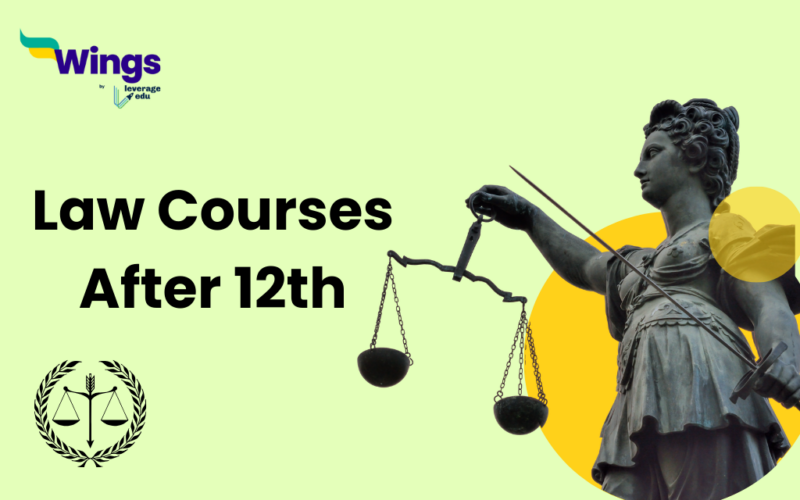The field of Law aims to explore the different legal systems related to almost every aspect of human lives, ranging from business, economics, human rights, international relations, and politics, amongst others.
Moreover, to pursue a successful career in law, you need to have an in-depth knowledge of the law system of your country as well as the different types of laws, human rights, jurisdiction and other legal aspects. Additionally, some of the greatest leaders studied law and went on to bring revolutions like Nelson Mandela, Mahatma Gandhi, and Barack Obama, amongst others.
If you are interested in exploring this intellectually challenging field of study, here is a blog that brings the top law courses and law courses after 12th, universities as well as the career scope they entail.
This Blog Includes:
- What do Law Courses Include?
- List of Law Courses
- Integrated Law Courses After 12th
- Certification Law Courses after 12th
- Diploma Law Courses after 12th
- Post Graduate Law Courses
- Subjects Covered in Law Courses After 12th
- Books & Study Material for Law Courses After 12th
- Eligibility Criteria for Law Courses After 12th
- Top Universities for Law Courses Abroad
- Top Universities for Law Courses in India
- Career Scope After a Law Course
- Why Should You Study Law Courses After 12th Grade?
- Jobs & Salary in Law Courses After 12th
- FAQs
What do Law Courses Include?
The legal system of a country regulates a varied set of rules which aim to enforce and implement laws to ensure that all citizens enjoy benefits granted through social or governmental systems. This is the crux of what Law courses encompass.
In addition, they cover laws in different aspects from criminal law to labour law as well as corporate law and other regulatory systems. You get to learn about the constitution in detail as well as how various laws and regulations came into being as well as their applications.
Along with this, most of these courses incorporate extensive practical training through mock trials, internships, and analyses of case studies, amongst others.
Consequently, there are mainly four types of Laws that you might come across while studying an academic programme in this field and these are:
- Criminal Law: The set of laws which penalise certain acts and omissions which are harmful to society and to a common Individual. Thus, they prescribe punishments and procedures according to the gravity of the crime.
- Civil Law: The law which renders aid to the person against any exploitation and bears no imprisonment but rather asks for compensation or reimbursement for damages.
- Corporate Law: A system of criminal justice that aims to ensure that business operations are facilitated by adhering to local and federal laws for conducting business legally.
- Labour Law: Its main objective is to ensure that employees aren’t taken advantage of by their employees and corporations and these laws regulate different issues such as unionizations, benefits disputes, etc.
Also Read: Career in Cyber Law
List of Law Courses
Here is a list of major Law courses offered across the globe:
| Education Level | Law Courses |
| Diploma | DipHE Law (Hons) or Cert HE – Law with Criminology Diploma in State Laws Diploma in Law |
| Bachelor | LLB Bachelor of Commerce and Bachelor of Laws LLB Hons Law BBA LLB Bachelor of Biomedical Science/Bachelor of Laws (Honours) Bachelor of Biomedical Science/Bachelor of Laws (Honours) LLB (Hons) Law With Legal Placement (Reed Smith) LLB (Hons) Law With International Study |
| Master | LLM LLM International Human Rights Law Master of International Relations and Master of International Trade and Commerce Law LLM General Pathway Master of Laws and Master of Security and Strategic Studies LLM in Commercial and Corporate Law LLM Law – International Commercial Law Master of Business Law LLM in Comparative and International Dispute Resolution |
| Doctoral | Doctorate in Law: Legal Protection and Social Cohesion Doctor of Philosophy (Law) PhD in Law PhD in Civil Law and Constitutional Legality |
Integrated Law Courses After 12th
The 5-year integrated model, as its name implies, entails the integration of two basic streams, one of which is the law and the other of which might be Arts, Management, Science, or Commerce.
Additionally, the legal information gained is the same whether you choose B.B.A. LL.B, B.Com LLB, or B.A. LL.B, but the respective program influences the manner you approach legal issues and the sort of job options that follow.
| Law Courses after 12th | Law Course Details after 12th (Full-Form) | Law Course Duration after 12th |
| BA + LLB | Bachelor of Arts & Bachelor of Legislative of Law | 5 years |
| BA + LLB (Hons) | Bachelor of Arts & Bachelor of Legislative of Law (Honours) | 5 years |
| BBA + LLB | Bachelor of Business Administration & Bachelor of Legislative of Law | 5 years |
| BBA + LLB (Hons) | Bachelor of Business Administration & Bachelor of Legislative of Law (Honours) | 5 years |
| B.Com + LLB | Bachelor of Commerce & Bachelor of Legislative of Law | 5 years |
| B.Com + LLB (Hons) | Bachelor of Commerce & Bachelor of Legislative of Law (Honours) | 5 years |
| BSL + LLB | Bachelor of Socio-Legal Sciences & Bachelor of Law | 5 years |
| BSc + LLB | Bachelor of Science & Bachelor of Legislative of Law | 5 years |
| BSc + LLB (Hons) | Bachelor of Science & Bachelor of Legislative of Law (Honours) | 5 years |
| BTech + LLB | Bachelor of Technology & Bachelor of Legislative of Law | 6 years |
Thus, in today’s increasingly globalized, unpredictable, complicated, and linked world, which is distinguished by constantly changing dynamics of social, economic, technical, regulatory, and financial settings, such programs are needed.
Furthermore, one cannot evaluate world issues in any sector and propose answers based on only one body of knowledge without understanding the impact of a single environmental change on all other disciplines.
As a result, law students must enrol in a course that will help them comprehend and appreciate the greater context of the role of law in a constantly changing environment and society.
Certification Law Courses after 12th
Additionally, here is a small list of some of the best certification courses that can be pursued by those aspirants and students who wish to take up law courses after 12th arts, commerce and science too:
- Certificate Course in Corporate Law
- Certificate Course in Anti-Human Trafficking
- Certificate Course in Business Law
- Certificate Course in Consumer Protection
- Certificate Course in Insurance Law
- Certificate Course in Cyber Law
- Certificate Course in Human Rights
Also Read: Cosmetology Courses
Diploma Law Courses after 12th
Here is a list of some of the top diploma courses in law after 12th grade for aspirants to pursue:
- Diploma in Criminology
- Diploma in Cyber Law
- Diploma in Human Rights
- Diploma in Information Technology Laws
- Diploma in Business Law
- Diploma in Co-operative Law
- Diploma in Corporate Law & Management
- Diploma in Taxation Laws
- Diploma in Women Studies & Gender Justice
- Diploma in Criminal Law
- Diploma in International Laws
- Diploma in Labour Laws
- Diploma in Labour Laws & Labour Welfare
Also Read: IPR Courses
Post Graduate Law Courses
By incorporating an advanced theoretical and practical curriculum, the postgraduate law courses upskill future lawyers with in-depth skills. In addition, there are a plethora of postgraduate law courses, a few of the popular ones are:
- LL.M. – Master of Law
- LL.M. (Business Law) – Master of Legislative Law in Business Law
- LL.M. (Constitutional Law & Administrative Law) – Master of Law in Constitutional Law and Administrative Law
- LL.M. (Constitutional Law) – Master of Legislative Law in Constitutional Law
- LL.M. (Corporate and Securities Law) – Master of Law in Corporate and Securities Law
- LL.M. (Corporate and Financial Law) – Master of Law in Corporate and Financial Law
- LL.M. (Criminal Law) – Master of Law in Criminal Law
- LL.M. (Criminal Law and Criminology) – Master of Law in Criminal Law and Criminology
- LL.M. (Energy Laws) – Master of Law in Energy Laws
- LL.M. (Human Rights) – Master of Law in Human Rights
- LL.M. (Environmental Law) – Master of Law in Environmental Law
- LL.M. (International Law, Constitutional Law and Human Rights) – Master of Law in International Law, Constitutional Law and Human Rights
- LL.M. (International Law, Constitutional Law and Human Rights) – Master of Law in International Law, Constitutional Law and Human Rights
- LL.M. Intellectual Property Rights
- LL.M. International Environmental Rights
- MA Business Law
- MA Criminal Justice
- MA Anti-Terrorism Laws
- MA Human Rights
- MA Criminology and Criminal Justice
- MA Public Policy Law and Governance
- MSc Intellectual Property Rights
Subjects Covered in Law Courses After 12th
Consequently, while the course offerings differ as per the programme, university, as well as country you have opted for, some of the subjects generally covered under Law courses, are as follows:
- Civil Laws
- Tax Laws
- Criminal Law
- Media Laws
- Labour Laws
- Environmental Law
- Family Law
- Constitutional Laws
- Employment Laws
- Real Estate Laws
- Competition Laws
- Banking Laws
- Intellectual Property Laws
- Law of Tort & Consumer Protection Act
- Women & Law
- Human Rights & International Law
- International Economics Law
- Company Law
- Administrative Law
- Contract
- Trust
- Property Law including the transfer of Property Act
- Jurisprudence
Also Read: Types of Lawyer
Books & Study Material for Law Courses After 12th
Many law books are available, particularly for undergraduate, postgraduate, and doctorate law programs some are:
| Book | Author |
| Introduction to the Constitution of India | D.D. Basu |
| Public Administration | M Laxmikanth |
| Indian Constitutional Law | M.P. Jain |
| Criminal Law – Incorporating the Criminal Law (Amendment) Act, 2013 | P.S.A. Pillai |
| Manual of Labor Laws | Waseem Ahmad Qureshi |
Also Read: Human Rights Courses
Eligibility Criteria for Law Courses After 12th
Additionally, the eligibility conditions for Law courses usually vary as per the programme and university you have chosen. Since LLB is more of an integrated programme, you can either complete your bachelor’s degree in a relevant field and then opt for LLB or directly pursue a course like BA LLB or BBA LLB after 12th grade.
Here is an overview of the eligibility prerequisites you must keep in mind while applying for a course in Law.
Educational Qualifications
For Law courses like BA LLB or BBA LLB: You must have completed 10+2 in any stream or its equivalent from a recognized board with the minimum marks specified by your chosen university.
For LLB: You must have completed a bachelor’s degree with a duration of 3-4 years in any field from a recognized university.
For LLM: You must have an LLB degree from a recognized law university and many universities also prefer candidates with prior experience in Law.
For LLD: You must have attained a PhD degree in a relevant field with 6-10 years of work experience in the industry.
Law Entrance Exams
Whether you are aspiring to pursue Law courses in India or abroad, there are certain law entrance exams that you must qualify to apply for your chosen programme.
To pursue an LLB, BA LLB or BBA LLB in India, you will have to qualify for university-specific entrance exams like DU LLB, MHT CET, etc. or take the national level exam CLAT which is conducted for LLB and LLM courses in India.
Furthermore, to pursue an LLB abroad, you need to qualify for either LNAT or LSAT depending on the requirements specified by your chosen university. Further, for LLM courses, many universities abroad ask for GRE scores.
Read about all Law Entrance Exams in detail in our blog!
Other Requirements
Further, to study for a Law degree abroad, you will be required to provide language proficiency test scores of IELTS, TOEFL, etc.
Along with this, you must also submit a Statement of Purpose (SOP) and some academic institutions might also require Letters of Recommendation (LORs).
Note: The aforementioned eligibility criteria indicate only general requirements only. Students are advised to go through the university website to check the actual eligibility and admission requirements for their chosen Law programme.
Skills Required for Law Courses After 12th
Furthermore, to pursue a career in law, you must have the skill set as well as extensive knowledge of the Constitution and penal codes, amongst others. Here are the key skills that Law courses aim to equip students with:
- Excellent Interpersonal and Communication Skills
- Fair and unbiased Judgement
- Team Spirit
- General IT skills
- General numerical skills
- Argumentative Skills
- Attention to Detail
- Research Skills
- Good Listening Skills
- Problem-solving skills
- Foreign language skills
- Willingness to Work Long and Odd Hours
- Multi-tasking skills
- Knowledge of legal matters
- Experience and skills in mooting
- Ability to draft legal documents
- Knowledge of current business, politics, sociology, and ethics/morality is essential.
Also Read: Social Justice
Top Universities for Law Courses Abroad
To help you further, here are the top universities for Law courses as per the QS World University Rankings 2024 for Law:
| University | Country | QS World Universities 2024 Rankings for Law |
| Harvard University | United States | #1 |
| University of Oxford | United Kingdom | #2 |
| University of Cambridge | United Kingdom | #3 |
| Yale University | United States | #4 |
| Stanford University | United States | #5 |
| London School of Economics & Political Science (LSE) | United Kingdom | #6 |
| Columbia University | United States | #7 |
| New York University | United States | #8 |
| University of California, Berkeley (UCB) | United States | #9 |
| National University of Singapore | Singapore | #10 |
| The University of Melbourne | Australia | #11 |
| The University of Chicago | USA | #12 |
| University of New South Wales | Australia | #13 |
| The University of Sydney | Australia | #14 |
| University College London | UK | #15 |
Top Universities for Law Courses in India
To help you further in your research, we have also made sure to list down the top universities for Law courses in India as per the NIRF University Rankings for Law:
| University/College | Location | NIRF Rankings: Law |
| National Law School Of India University (NLSIU) | Bangalore | 1 |
| National Law University | Delhi | 2 |
| Symbiosis Law School | Pune | 3 |
| Nalsar University of Law | Hyderabad | 4 |
| The West Bengal National University of Juridical Sciences | Kolkata | 5 |
Indian Institute of Technology, Kharagpur | Kharagpur | 6 |
| Jamia Millia Islamia, New Delhi | New Delhi | 7 |
| Gujarat National Law University | Gandhinagar | 8 |
| Siksha `O` Anusandhan | Bhubaneswar | 9 |
| National Law University, Jodhpur | Jodhpur | 10 |
Career Scope After a Law Course
Completing a degree or diploma in law, thereafter students can explore a wide range of career opportunities in the legal sector and depending on their field of expertise. Moreover, some of the major career prospects you can explore after completing a Law degree include:
- Criminal Lawyer
- Corporate Lawyer
- Civil Litigation Lawyer
- Legal Analyst
- Document Drafting Lawyer
- Legal Journalist
- Legal Advisor
- Government Lawyer
- Judge
- Legal Trainer
- Barrister
- Advocate
- Company Secretary
- Solicitor
Also Read: How to Become an Immigration Lawyer?
Along with this, the key employment areas for graduates of Law courses are as follows:
- Judiciary
- Academia
- Civil Services
- Corporate Law Firms
- Taxation Firms
- Governmental Regulatory Bodies
Why Should You Study Law Courses After 12th Grade?
Because legal degrees may be paired with other credentials, you will be able to work in a variety of industries, including business, academia, industrial, commercial, social service, politics, and many more. Additionally, there will never be a dull moment in your legal career since attorneys must be quick-witted, intelligent, and exceptional problem solvers who can think outside the box at any time. Law Officers, Legal Associates, Junior Lawyers, Legal Expert Advisors, Corporate Lawyers, Human Rights Activists, and Litigators can all be recruited after obtaining a BA LLB. Professionals can continue their education by obtaining a postgraduate legal degree, such as an LLM, with a concentration of their choice.
Jobs & Salary in Law Courses After 12th
As we all know, the law is a well-respected profession. It is a trustworthy and honest field. During the early stages of their careers, freshers must work for a reputable legal business or lawyer.
According to a recent poll conducted by the Bar Council of India, India has a huge demand for experienced attorneys. Only 20% of Indian law students are qualified to work in a courtroom.
Even if you choose to work overseas, you will have strong chances in the United Kingdom and the United States since Indian law is quite similar to British law.
Moreover, here are a few examples of lawyer titles:
- Criminal Lawyer
- Civil Litigation Lawyer
- Legal Analyst
- Document Drafting Lawyer
- Legal Journalist
- Legal Advisor
- Government Lawyer
- Judge
Salary
Furthermore, one of the finest aspects of this job is the pay. If you are a skilled lawyer and practice on your own, the sky’s the limit. You can earn roughly Rs. 5,000 to Rs. 20,000 per month as a stipend once the training is completed and you are working under the supervision of specialists.
When you first start working in court as an individual, you may expect to earn between Rs. 20,000 and Rs. 50,000 per month.
Also Read: Skill Development Courses
FAQs
Ans. After graduating from high school, you can enrol in a five-year LLB program. Following graduation, it usually takes three years to obtain an LLB.
Ans. To enrol in integrated legal programs such as BA LLB, BBA LLB, BSc LLB, and BCom LLB, candidates must have passed Class 12. Candidates pursuing three-year LLB programs, on the other hand, must have completed a bachelor’s degree in any discipline.
Ans. Some of India’s most popular undergraduate and postgraduate law programs include:
BA LLB
BBA LLB
BCom LLB
BSc LLB
LLB
LLM
Related Reads
Hence, we hope that this blog helped you explore the major Law courses, their eligibility requirements, top universities, as well as other details. Planning to pursue a degree in Law? Let the Leverage Edu counsellors guide you in selecting a suitable programme and university that fits your preferences, interests and career goals with the help of our AI Course Finder tool! Sign up for an e-meeting with us today!
-
Thank you for the information. It will sure go a long way
-
Thank you for the comment! Here are some blogs on Law that will interest you:
https://leverageedu.com/blog/best-universities-for-law-courses/
https://leverageedu.com/blog/law-universities-in-uk-without-lnat/Hope this helps! Don’t forget to sign up for our newsletter for weekly updates!
-
-
Wow!
Law is that wide?
Very interesting course

 One app for all your study abroad needs
One app for all your study abroad needs






























 45,000+ students trusted us with their dreams. Take the first step today!
45,000+ students trusted us with their dreams. Take the first step today!



5 comments
Thank you for the information. It will sure go a long way


Thank you for the comment! Here are some blogs on Law that will interest you:
https://leverageedu.com/blog/best-universities-for-law-courses/
https://leverageedu.com/blog/law-universities-in-uk-without-lnat/
Hope this helps! Don’t forget to sign up for our newsletter for weekly updates!
Wow!
Law is that wide?
Very interesting course
Can a individual select a 3-year law course with any other following graduation
LLB can be done without entrance exam after BCOM ?